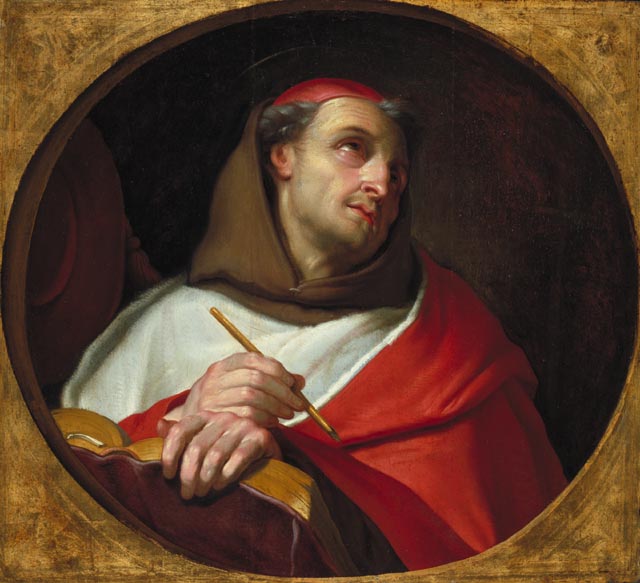Today is the Feast Day of Saint Bonaventure, one of the Doctors of the Church I’m very interested in at the moment.
Pope Benedict XVI was a fan of Bonaventure; his habilitation (the diploma that qualified him for full professorship) was on Bonaventure. I am still looking for good reading material on Bonaventure (feel free to chime in in the comments). Benedict did three great homilies on Bonaventure (one, two, three). Today News.va did a very relaxing musical podcast on Bonaventure.
According to Benedict, Bonaventure might be the man we need to “blame” for Modernity:
“Opera Christi non deficiunt, sed proficiunt”: Christ’s works do not go backwards, they do not fail but progress, the Saint said in his letter De Tribus Quaestionibus. Thus St Bonaventure explicitly formulates the idea of progress and this is an innovation in comparison with the Fathers of the Church and the majority of his contemporaries. For St Bonaventure Christ was no longer the end of history, as he was for the Fathers of the Church, but rather its centre; history does not end with Christ but begins a new period. The following is another consequence: until that moment the idea that the Fathers of the Church were the absolute summit of theology predominated, all successive generations could only be their disciples. St Bonaventure also recognized the Fathers as teachers for ever, but the phenomenon of St Francis assured him that the riches of Christ’s word are inexhaustible and that new light could also appear to the new generations. The oneness of Christ also guarantees newness and renewal in all the periods of history.
For Bonaventure, the life of St Francis and the phenomenon of Franciscan life, which differed from the previous modes of monastic life, showed that Progress was not only possible, but guided by Divine Providence. For Benedict, this is apparently the first time that such an idea of Progress makes its decisive entry into the life of the Church and the intellectual life of the West writ large.
This actually intersects with one of my key interests, as readers will know, of “reconciling” Modernity and Christianity.
My overall thesis about Modernity could be stated as such: the phenomenon of Modernity grows out of, and from, a growing awareness of human fallibility or, in Christian terms, of original sin. The three most prominent achievements of modernity–the scientific method, liberal democracy and the free enterprise system–all stem from the recognition of failure; respectively the failure to understand the ultimate causes of things, the failure to wield power without corruption, and the failure of central planning.
If this is true, then, the failure of Modernity occurs when Modernity forgets itself; when Modern Man forgets that he can only be Modern Man when he is aware of his own fallibility, he becomes tempted to utopianism; to coin a phrase, human fallibility becomes a bug, not a feature, and must be fixed–at all costs–, rather than understood and managed.
If Bonaventure is the seed of Modernity, what can we learn from Bonaventure about how Modernity may save the Christian life?
Two inchoate thoughts:
As Hans Urs von Balthasar and others have noted, of the classic three great transcendentals (True, Good, Beautiful), Bonaventure places great emphasis on Beauty. Bonaventure’s theology–taking after his master Francis–is a theology of Beauty. By contrast, Modernity often relegates beauty to a secondary space. Kant, the ur-Modern philosopher, devoted his three great “critiques” to the trancendentals: the Critique of Pure Reason on the True, the Critique of Practical Reason on the Good and, in third place, the Critique of Judgement on the Beautiful, which subordinates Beauty to the Good and the True and argues that aesthetic judgement is fundamentally subjective. Modernity suffers from a Beauty deficit, and this deficit is one of the appeals of totalitarianism, which was often pitched as a movement to re-aesthetize the world, as testified to by its terrible and powerful aesthetic (think Riefenstahl and Eisenstein). What would a Modern re-beautification of the world look like? Is it even possible or desirable?
If Modernity can be described as growing awareness of human fallibility, and if the danger of Modernity is when Modernity forgets itself, then clearly the antidote to Bad Modernity is humility. But perhaps humility is not even the right word–“humility” can be performative. Perhaps, through Bonaventure from Francis, we could say that the right word is poverty. Perhaps to work well, Modernity requires a spirit of poverty, the kind of evangelical poverty that Francis modeled, but not so much, perhaps, a temporal poverty as a spiritual poverty. To take one very specific example, the free enterprise system works splendidly at enabling human flourishing, unless and until it leads to such extremes of wealth that the political economy and the market system itself become corrupt; we can then think of a free enterprise system animated by spiritual poverty, that is to say, a system whose actors understand themselves as enabled to create wealth, but reluctant to accumulate it, always either donating or reinvesting their gains, thereby ensuring the broad circulation of capital. Is Franciscan and evangelical poverty the missing cornerstone of Modernity? What would that look like in the various domains and vocations of life?
This is a sketch, of course.
Saint Bonaventure, Seraphic Doctor, pray for us!
“François, Claude (dit Frère Luc) – Saint Bonaventure” by François, Claude (dit Frère Luc) – [1]. Licensed under Public domain via Wikimedia Commons.













